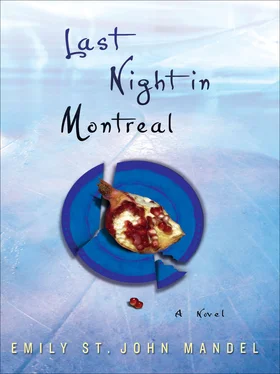On her first day in Rome she went to an Internet café, and after some time she emerged with a phone number for a house in Quebec. In the motel room she sat for a long time holding the scrap of paper in her hands and then placed a wildly expensive long-distance call. A man answered on the second ring.
“Simon,” she said.
“Who is this?” he asked, in French.
“C’est moi.”
“Lilia?”
“I just wanted to thank you,” Lilia said.
Simon was quiet for a moment before he spoke. “Don’t thank me,” he said finally. “It was all I could do.”
An hour later she hung up the phone and went out into the city. She made her way back to the Tiber River and walked back to the same bridge, the lists far downstream and the policeman long departed, and stayed there for a long time looking down at the water. Ten years later she stood in the same place with her Italian husband on the day of their seventh anniversary of marriage, and he laughed when she imitated the policeman.
“It was scary,” she insisted. “I thought I’d be arrested for littering and deported on the spot.”
“I know,” he said, still laughing. “You tell me that every year, my love, but when in your life were you ever scared?”
Once on a highway in the American mountains, once on a subway platform in Montreal. Seldom, in other words, but she was left with strange memories. It wasn’t a question of unhappiness, but her thoughts drifted back at odd moments: when she was walking alone on certain boulevards in the rain; “There’s a Central Australian language,” Eli once told her, “that has a word, nyimpe, I’m mispronouncing it, that means ‘the smell of rain.’” (Difficult now to remember his face; his hair was dark, but were his eyes brown or blue?) Or sometimes when she woke up in winter and the covers had fallen off the bed, the mere sensation of cold was enough to bring the streets of Montreal back to her; wandering with Michaela through the ice-locked landscape, arguing, shivering, talking in circles about memory and accidents. Michaela wasn’t someone Lilia ever trusted, but there was a certain kinship; she shared Lilia’s suspicion that the world might prove, in the end, to have been either a mirage or a particularly elaborate hoax.
Or when she stood in a metro station at the end of the day, waiting for the train that brought her from a translation job at the Vatican to the apartment she shared with her husband a few miles away, Lilia was sometimes shocked by a memory so forceful that it rendered her breathless. She could close her eyes and watch Michaela coming down the stairs at Métro Place-des-Arts; Michaela had been crying a short time earlier but now she came to Lilia smiling, a red cigarette box crushed in one hand. The moment Lilia saw her she stood up from the bench and started to repeat herself, Tell me what happened, but Michaela was smiling as she came toward her and she kissed Lilia lightly on the lips before Lilia could finish the sentence. Her lips were cold from the air aboveground.
“Listen,” Michaela said. She put her hands on Lilia’s shoulders then and whispered a story in her ear. It was an old story about broken windows and snow, over in a few sentences, and when she was done Lilia sank down onto the bench, staring up at her, shocked into silence. In a few minutes Eli would run past her screaming Michaela’s name, in a few minutes the night would implode into noise and catastrophe, but for now Michaela stood near her, watching her, and Lilia had never seen her so still or so calm. Michaela’s voice was gentle when she spoke.
“Do you remember now?”
Lilia nodded. Yes. I remember everything.
“I’ve made my decision,” Michaela said. Lilia was struck by a look she’d never seen before; there were tears in Michaela’s eyes, but her face was radiant. “I’m leaving tonight.”
Lilia swallowed and found her voice. “You sound happy.”
“I am.”
“Where are you going?”
“Far away,” Michaela said. She smiled then, already leaving, and walked away down the platform to meet her train.












